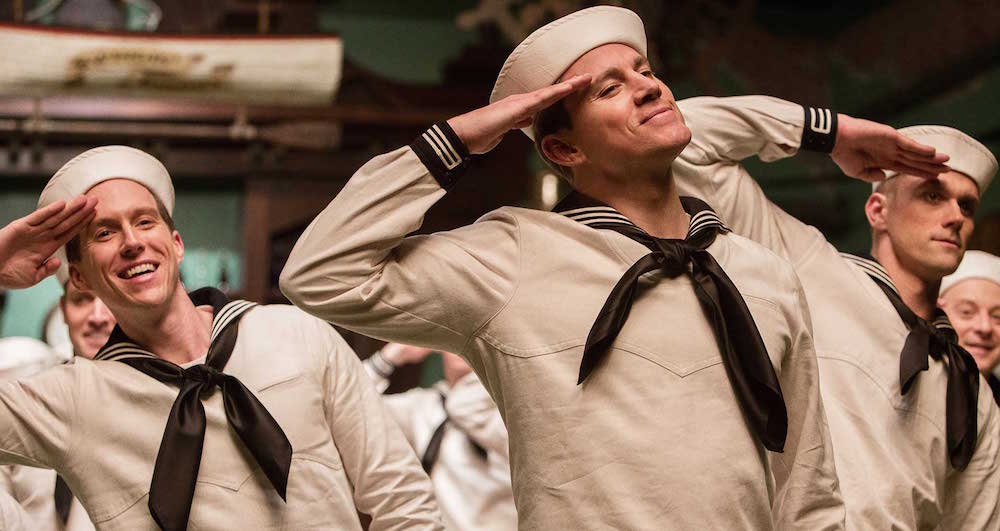I’ll confess that, for the longest time, my biggest sticking point with Hail, Caesar! was its February release date. A prestige picture about the good old days of Hollywood by Hollywood darlings the Coen Brothers seemed ripe for awards glory, yet the studio pushed its release past the point of consideration. What made the studio put it out in the no man’s land of February?
And for about half this picture’s running time, I thought my worst fears were being realized — that the Coen Brothers had made a film bending and breaking under self-indulgent weight. The story was shaggy and all over the place. I was laughing, but it was largely just the critic’s section cracking up along with me, while the popular audience sounded absolutely dead, barring a few undeniably big, comedic moments.
Then Channing Tatum was in a Gene Kelly musical number where a sailor’s crotch was being swung into his face. I saw a couple clips from the film being made within the film, also called Hail, Caesar!, a prestige pic rip-off of Ben-Hur that seemed to be a complete and utter disaster, and I started to get what this film was doing.
Hail, Caesar! is a film where plot is explicitly secondary to entering and exploring the world and the people within it; the philosophical implications therein and who these people are are far more important than what they’re doing. It’s a film that celebrates and mocks classical Hollywood in the same breath, yet understands the meaning that the world gives to those within it and to those who have come since.
Our guide through classical Hollywood is Capitol Pictures Head of Physical Production Eddie Mannix (Josh Brolin), a man of faith and morals in a world that praises neither. He’s a fixer, a man who protects the investment that the studios make in their stars by keeping their dalliances out of the public eye; after all, Hollywood is all about the brand.
We join him on a particularly bad day — at least it seems that way from the outside. Mannix’s deadpan demeanor makes everything seem dire and trifling in equal measures. DeeAnna Moran (Scarlett Johansson), a star of aquatic musicals, is pregnant but without a husband. Hobie Doyle (Alden Ehrenreich) is a star of Westerns that the studio has decided to shift to starring in classy, dialogue-based pictures that has put poor hillbilly Hobie completely out of his element, leading to conflict with director Laurence Laurentz (Ralph Fiennes).
And worst of all, Baird Whitlock (George Clooney), Capitol Pictures’ biggest star, has gone missing, kidnapped by a group calling themselves “The Future,” disrupting the production of Hail, Caesar: A Tale of the Christ, the shlocky, purposely inoffensive picture that seems to be in huge trouble thanks to this development.
I’ve laid out a lot of plot, and if you’re scared right now, that’s reasonable. There’s entirely too much going on. But don’t worry, the film is entirely content to wrap up its plot as soon as it can, as it’s pretty much entirely a vehicle to move through this world.
It’s a world that the Coens have, on every level, crafted perfectly. It’s a glamorous world with just the right amount of scuff to make things feel mysterious and impenetrable. The clips from the films Capitol is making, barring advances in camera technology, look and feel remarkably like classical Hollywood films, with the aforementioned Channing Tatum-doing-Gene Kelly sequence feeling absolutely authentic and enjoyable in every way, a lost joke from some obscure musical.
And it’s a world with people who feel entirely authentic. Every actor is perfectly cast and playing their role to the rafters. I’ve alluded to how great Brolin is in this role, but it must be restated. Brolin perfectly deadpans every moment, anchoring us with the calm center of this exceedingly bizarre world. He portrays perfect conviction and sells every moment.
And Alden Ehrenreich, perhaps the most obscure member of the main cast, ends up stealing the show. His sweet stupidity portrays a host of skills and an impressively charismatic hold on the audience as a hillbilly thrust into the glamorous Hollywood world.
In fact, much of the strength of this cast simply seems to have been finding the right person and letting them loose. Channing Tatum as a Gene Kelly-type with a twist, Ralph Fiennes as a preening director and Tilda Swinton as a set of busybody gossip columnists all seem such a natural fit.
This is what really begins to get into what the Coen Brothers are doing with Hail, Caesar! While the influences of classic filmmakers rest across this film, the biggest influence seems to be a contemporary: Wes Anderson. The Coens are borrowing his immaculate sense of production design and straight-faced sense of humor to turn Hail, Caesar! into a clockwork world, set up for the two to get into and explore. Every movement and moment is perfectly timed to cut into their concerns with this film, which is filmmaking itself.
It’s an obvious focus, with the film’s discussion of the worth that comes with “[serving] the picture.” But I don’t think it’s as simple as another story about how great film storytelling is and how great Hollywood is.
There’s a remarkable amount of aspersion cast upon the world of Hollywood, a lot of questions about how ridiculous this world is. Mannix is ready to leave it behind. The Coens raise the question of why the hell they’re making a world like this and reaching further into the beating heart of us all, asking why the hell we do what we do.
The twists and turns through Hollywood reveal its good and its bad, and it is for the Coens to see what they can find within this world. Turns out, for all its flaws, it’s what gives them worth — it’s the purpose they’ve discovered.
And that’s the true strength of Hail, Caesar! It’s beautiful and funny, even if it takes the film quite some time to reveal those qualities. But more importantly, it’s these amazing filmmakers cutting very deeply into questions of who we are and finding a pleasant answer on the other side.
Grade: A-
Opinion Editor | Brandon Wagner is a College Senior from God Only Knows Where, America studying Film and Media Studies with a minor in Religion. This is his first year for the Wheel, in a likely misguided experiment to be a film critic. When he's not writing on the biggest blockbusters or the films of Spike Jonze or Andrei Tarkovsky or Zack Snyder, he's writing on comedic television, the future of gaming as an art, or the relationship between audience and cinematic experience. In other words, Brandon Wagner has basically nothing else going on but this.






